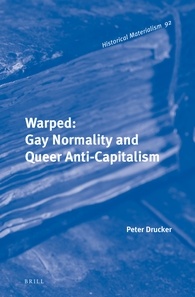Peter Drucker, International Institute for Research and Education
Recent victories for LGBT rights, especially the spread of same-sex marriage, have gone faster than most people imagined possible. Yet the accompanying rise of gay ‘normality’ has been disconcerting for activists with radical sympathies. Global in scope and drawing on a wide range of feminist, anti-racist and queer scholarship and analysis, Warped: Gay Normality and Queer Anti-Capitalism shows how the successive ‘same-sex formations’ of the past century and a half, corresponding to different phases of capitalist development, have led both to the emergence of today’s ‘homonormativity’ and ‘homonationalism’ and to ongoing queer resistance. The book’s second half summarises different sexual rebellions and the queer dimension of multifarious movements for social justice and transformation, seeing in them harbingers of a unified and powerful queer anti-capitalism.
Biographical note
Readership
Reviews
Eileen Boris, Hull Professor of Feminist Studies, University of California, Santa Barbara, co-editor, Intimate Labor: Cultures, Technologies, and the Politics of Care
“Peter Drucker’s important book, Warped, addresses the concern many of us on the left feel with the current structure, values and direction of the organized LGBT movement and its focus on winning ‘acceptance’ into a society that remains structurally oppressive. Drucker posits an alternative vision: an LGBT struggle that challenges the gay/straight binary, acknowledges the vast array of same-sex formations that actually characterize human societies, breaks free of its current narcissistic isolation and re-orients itself to form strong links with a global, class-conscious, anti-racist, feminist movement. Deeply researched and persuasively argued, Warped deserves to be widely read and discussed–it is a potentially transformative work.”
Martin Duberman, Distinguished Professor of History Emeritus, CUNY, author of Paul Robeson: A Biography
“Theoretically astute and globally informed, Warped offers a synthesis of socialist-feminist, anti-racist writing on the history of sexuality in capitalism and a passionate vision of possibilities for radical politics in the 21st century. Drucker’s lifetime of engagement in the revolutionary left, queer activism, and feminist theory shines through the pages of this important contribution to our movements.”
– Johanna Brenner, Prof Emeritus, Sociology/ Women’s Studies, Portland State University, Author of Women and the Politics of Class
“This hopeful and important book delivers what few have attempted: it articulates the contours of a radical queer political agenda and movement. That Peter Drucker does so in engaging prose, with insightful readings of theorists and activists across many movements and continents, that he attempts a new synthesis to illustrate that there could be a path beyond neoliberal gay politics, makes this one of the most ambitious new books to appear about the lesbian, gay, bisexual, transgender and queer political movement.”
– Urvashi Vaid, author of Irresistible Revolution: Confronting Race, Class and The Assumptions of LGBT Politics
“This book is a crucial resource for activists fighting for sexual liberation and for anyone working to build a better world. Peter Drucker maps the changing ways that capitalism organizes gender and
sexuality, creating both unfreedom and possibilities for liberation.
This map provides key navigational tools for the complex journey beyond the important but limited gains we have won in the field of lesbian and gay rights to a society of real freedom.”
– Alan Sears, Professor of Sociology, Ryerson University, author of The Next New Left
Table of contents
Introduction: What’s at Stake?
Understanding Same-Sex Histories
PART I: ORIGINS OF GAY NORMALITY
Prologue: Before Homosexuality
Chapter 1. Imperialism and Inversion
Chapter 2. Fordism and Gay Identity
PART II: GAY NORMALITY UNDER NEOLIBERALISM
Chapter 3. Homonormativity and Queer
Chapter 4. The Sexual Politics of Neoliberalism
PART III: CHALLENGES FOR A QUEER ANTI-CAPITALISM
Chapter 5. Towards a Queer Sexual Politics
Chapter 6. Queering Broader Movements
Conclusion: The Principle of Hope
References
Index

